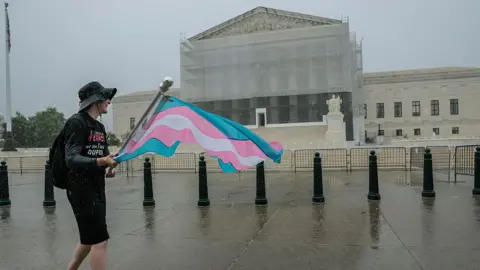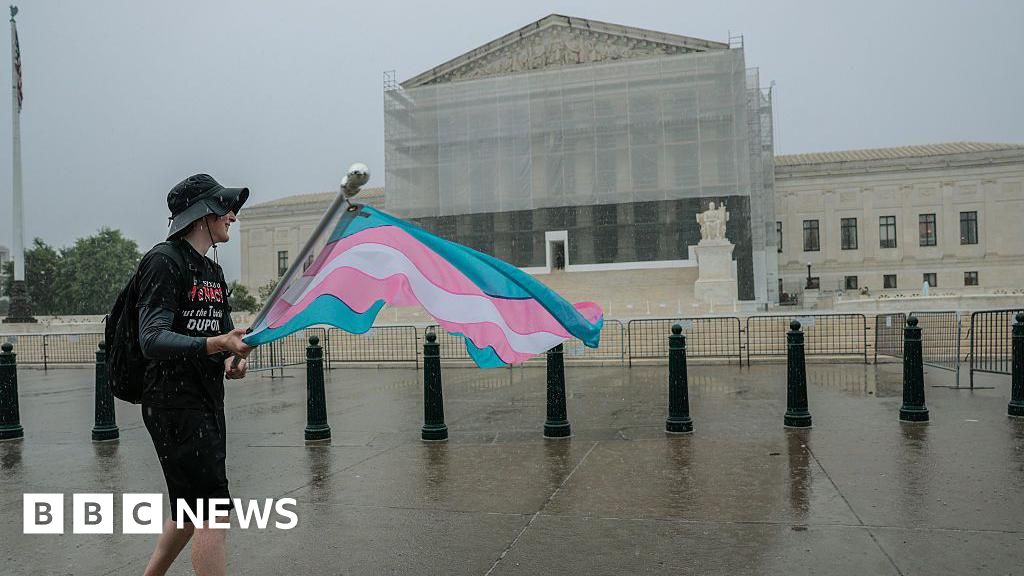 Getty Images
Getty Images
Protester carries transgender pride flag in front of Supreme Court
The US Supreme Court will allow the Trump administration to require all new passports to display an individual’s biological sex at birth, for now.
The conservative-majority court on Thursday froze an order from a lower court in Massachusetts that had stopped the US government from changing its policy, while the legal process played out.
“Displaying passport holders’ sex at birth no more offends equal protection principles than displaying their country of birth,” the court said.
On his first day in office, Trump signed an executive order recognising only two sexes, leading the US to issue passports with just male or female designations, based on a person’s sex recorded at birth.
The Biden administration had allowed people to self-select their gender on passports and added a third option – X – to the travel document, which is issued by the State Department.
The win for the Trump administration – the latest on the high court’s emergency docket – means that individuals can no longer show their chosen identity on new or renewed passports in the near future.
The unsigned order said that the government, with its new policy, is “merely attesting to a historical fact without subjecting anyone to differential treatment”.
The Supreme Court also said the administration “is likely to succeed on the merits”, indicating the justices are inclined to issue a final ruling that would uphold the requirement when the case reaches them.
The three liberal justices dissented.
The plaintiffs in the case are transgender activist Ash Lazarus Orr, four other transgender Americans and two nonbinary individuals. They have argued that the limitations in the gender field amounted to harassment and could lead to violence against transgender individuals.
Shortly after Trump issued his executive order on passport gender designation, US actor Hunter Schafer said she was shocked when she received a new passport that lists her gender as male instead of female, criticising the policy.
“It doesn’t change really anything about me or my transness, however, it does make life a little harder,” the Euphoria star said.
The high court’s decision comes as the Republican president continues to end the policies of his predecessor on transgender Americans as well as on diversity, equity and inclusion, or DEI
The State Department had, since 1992, permitted passport sex designations to differ from sex assigned at birth with medical documentation.
In April, a judge in Boston, Massachusetts, said that the Trump administration policy is likely discriminatory based on sex. Judge Julia Kobick, a Biden appointee, said that the policy was rooted in “irrational prejudice” toward transgender Americans and violated their equal protection rights under US Constitution’s fifth amendment.
In June, Kobick issued an order that blocked the policy’s enforcement.
In dissenting on Thursday, Supreme Court Justice Ketanji Brown Jackson accused the Supreme Court’s six conservative justices of “senseless sidestepping of the obvious equitable outcome,” saying it had become an “unfortunate pattern”.
“This Court has once again paved the way for the immediate infliction of injury without adequate (or, really, any) justification,” she wrote. “Because I cannot acquiesce to this pointless but painful perversion of our equitable discretion, I respectfully dissent”.
Trump’s top prosecutor, Attorney General Pam Bondi, celebrated the court’s stay as the Justice Department’s “24th victory at the Supreme Court’s emergency docket”.
Secretary of State Marco Rubio described it as “a huge win” for the president and “for common sense!”
The high court has ruled favourably for the president in similar cases dealing with gender ideology over the past few months.
In May, it temporarily allowed the administration to enforce its ban on transgender people serving in the military, which Trump set in motion with a separate executive order.
The administration has also pushed for policies to restrict certain kinds of healthcare for minors who identify as transgender, and to prevent transgender women from playing on women’s sports teams.
In August, the Supreme Court also allowed the administration to terminate the National Institutes of Health’s various research-related grants related to DEI objectives, gender identity and Covid.


